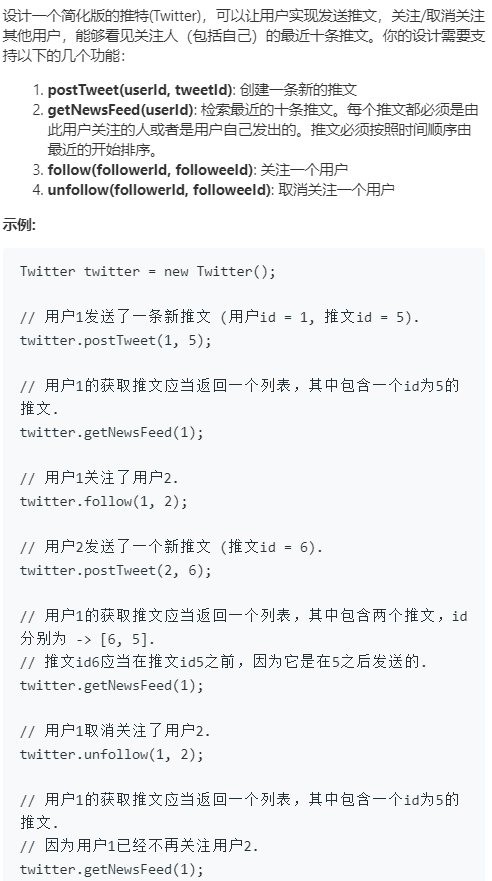NO.355 设计推特 中等

思路一:哈希表+链表+堆 第一次遇到设计题感觉还是很棘手的,所以啰嗦一下的过程,为下次积攒经验。
推文实体:本题只考虑添加新推文,不需要删除、修改、随机访问。所以用单链表来实现,而且链表不需要考虑扩容的问题。每条推文包含id、时间戳、并作为链表节点。
1
2
3
4
5
6
7
8
9
10
11
| private static class Tweet{
public int id;
public int time;
public Tweet next;
public Tweet(int id,int time){
this.id=id;
this.time=time;
this.next=null;
}
}
|
推特实体:构造方法、发一条推文方法、返回关注的人最新发的十条推文方法、关注一个人方法、取关一个人方法。推文时间的生成,用全局变量实现。
1
2
3
4
5
6
7
8
9
10
11
12
13
14
15
16
17
18
19
20
21
22
23
24
25
26
27
28
29
30
31
32
| public class Twitter {
private static int timestamp=0;
private class Tweet{...}
HashMap<Integer,Tweet> twitter;
HashMap<Integer, HashSet<Integer>> followed;
PriorityQueue<Tweet> maxHeap;
public Twitter() {}
public void postTweet(int userId, int tweetId) {}
public List<Integer> getNewsFeed(int userId) {}
public void follow(int followerId, int followeeId) {}
public void unfollow(int followerId, int followeeId) {}
}
|
接下来是具体的四个API实现:
发一条推文:需要维护一个用户和所发推文列表的对应关系,用HashMap实现。新推文加入推文列表采用头插法,让最新的推文保持在表头,形成从新到旧的顺讯(时间戳从大到小)。
1
2
3
4
5
6
7
8
9
10
11
12
13
14
| public void postTweet(int userId, int tweetId) {
timestamp++;
if (twitter.containsKey(userId)) {
Tweet oldHead = twitter.get(userId);
Tweet newHead=new Tweet(tweetId,timestamp);
newHead.next=oldHead;
twitter.put(userId,newHead);
}else {
twitter.put(userId,new Tweet(tweetId,timestamp));
}
}
|
时间复杂度:O(1)
关注一个人方法、取关一个人方法:每个用户都有一个关注列表,用HashMap存储这个对应关系;关注列表不需要有序只需要唯一即可,为了存取方便选用HashSet实现;每个用户
1
2
3
4
5
6
7
8
9
10
11
12
13
14
15
16
17
18
19
20
21
22
23
24
25
26
|
public void follow(int followerId, int followeeId) {
if (followeeId==followerId)return;
HashSet<Integer> set = followed.get(followerId);
if (set == null) {
HashSet init=new HashSet();
init.add(followeeId);
followed.put(followerId,init);
}else {
if (set.contains(followeeId))return;
set.add(followeeId);
}
}
public void unfollow(int followerId, int followeeId) {
if (followeeId==followerId)return;
HashSet<Integer> set = followed.get(followerId);
if (set == null) {
return;
}
set.remove(followeeId);
}
|
时间复杂度:O(1)
返回关注的人最近的动态方法:到这里应该已经知道每个人都有自己一个链表作为推文列表(头插法最新的在前面),我们要做的就是将这关注列表中的K个人的有序推文列表合并,获得前10个即可。
于是这个问题就转换为NO.23合并K个有序链表,只不过本题是降序而已。这里我们可以使用一个大顶堆,将所有关注用户(包括自己)的推文列表的头节点入堆,然后每次弹出堆顶节点node,放入结果集,如果node.next不为空将next入堆。
直至结果集中有十条推文时返回。
1
2
3
4
5
6
7
8
9
10
11
12
13
14
15
16
17
18
19
20
21
22
23
24
25
26
| public List<Integer> getNewsFeed(int userId) {
maxHeap.clear();
if (twitter.containsKey(userId)) maxHeap.offer(twitter.get(userId));
HashSet<Integer> followedList = followed.get(userId);
if (followedList != null && followedList.size() > 0) {
for (Integer followedId : followedList) {
Tweet tweet = twitter.get(followedId);
if (tweet != null) {
maxHeap.offer(tweet);
}
}
}
List<Integer> res = new ArrayList<>();
int count = 0;
while (!maxHeap.isEmpty() && count < 10) {
Tweet tweet = maxHeap.poll();
res.add(tweet.id);
count++;
if (tweet.next != null) maxHeap.offer(tweet.next);
}
return res;
}
|
时间复杂度:O(nlogn) n是参数用户的关注数量,弹出堆顶O(1),入堆调整O(logn),最多入堆n次。
本人菜鸟,有错误请告知,感激不尽!
更多题解和源码:github
